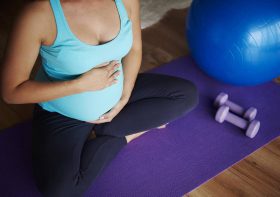Physical Changes You Experience During Pregnancy

From the moment you become pregnant, your body begins to go through many changes. The major systems in your body, such as circulatory, hormonal and musculoskeletal, experience transformations to adjust to the life growing inside you. It’s essential to see a doctor during this time so that they can monitor this process and ensure you and your baby stay healthy. If you are looking for prenatal care, there may be a free women’s clinic Cicero, IL in your town. Read on to learn more about the changes to expect during pregnancy.
Fluctuating Hormones
As the egg implants into your uterus, it signals your body to make some drastic changes to hormone levels. These hormones stop menstruation and signal your body to create an environment supportive of life. The hormones responsible for this are progesterone, estrogen and HCG. As these chemicals increase dramatically over the first few weeks of pregnancy, you notice a decrease in your energy level and an increase in moodiness, as well as nausea and vomiting. As these crazy hormones begin to plateau during the end of the first trimester, you experience more energy and begin to feel better.
Increasing Blood Volume
The growing fetus relies on your blood supply for all nutrients and oxygen during pregnancy. Your body increases the volume of blood in your body to accommodate this demand. As this happens, it causes your heart, liver and kidneys to work harder. It’s important to eat foods with a lot of iron to ensure you don’t become anemic. As your uterus expands, it puts pressure on surrounding blood vessels, making you feel dizzy when you stand up or move too quickly. To prevent this, stand up slowly, wear loose-fitting clothing and stay hydrated throughout the day.
Loosening of Joints
Hormones and your growing baby put pressure on different parts of your body, causing aches and pains you’ve never felt before. The hormone relaxing causes joints and ligaments to loosen to prepare your body for delivery. You may also feel minor back pain and your baby begins to push against nerves and muscles. The outward growth of your uterus causes the ligaments in your abdomen to stretch and spread apart, sometimes causing shooting or pulsating pain. This discomfort is nothing to worry about, and a maternity belt may help support these ligaments as your baby continues to grow.
Slowing of Digestion
It’s no surprise that a growing baby puts pressure on your stomach and digestive system. In addition, your fluctuating hormone levels slow down the digestion process. This change often leads to constipation, nausea and heartburn. Some medications are safe to take during pregnancy, so if you experience these unpleasant symptoms, ask your doctor which to take.
Developing Fluid Retention
Towards the end of your pregnancy, it’s not uncommon to experience fluid retention. If you notice your feet and legs swelling, find comfortable shoes and try to put your legs up in the evening. Staying hydrated helps flush your body of this excess fluid, so ensure you are drinking plenty of water.



